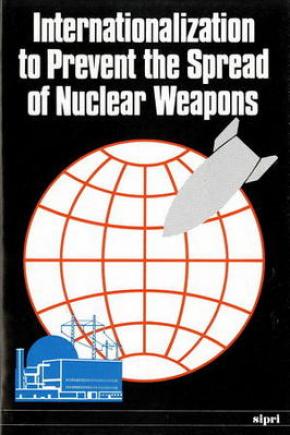Internationalization to Prevent the Spread of Nuclear Weapons

In August-September 1980 the second Review Conference of the Non-Proliferation Treaty (NPT) will take place in Geneva. As this Treaty is the most important barrier to the proliferation of nuclear weapons, the results of the Conference will obviously have major effects in the field of arms control and disarmament.
The implications of the recent International Nuclear Fuel Cycle Evaluation (INFCE) are that the technological capabilities of many countries are such that there is no technical solution to the problem of the spread of nuclear weapons to countries that do not now have them. Thus, it appears that if there is a solution at all, it must be political in nature.
A possible element in such a political solution is the internationalization of the sensitive parts of the nuclear fuel cycle; that is, those parts that have the potential of producing fissile materials to make nuclear weapons. Although the intricacies of a system of internationalization are still unresolved, the concept, if realized, would provide another powerful political barrier to nuclear weapon proliferation—a reinforcement for the aims of the NPT itself.
Against this background, and as a follow-up to its first symposium and the resultant book, Nuclear Energy and Nuclear Weapon Proliferation, SIPRI convened a second international group of experts to continue its discussions of issues pertinent to the forthcoming NPT Review Conference. The meeting took place at SIPRI in Stockholm, 31 October-2 November 1979, when the feasibility of internationalizing the nuclear fuel cycle was examined.
SIPRI's views on this complex approach are expressed in Part I of this book—Internationalization to Prevent the Spread of Nuclear Weapons. Part II contains the papers that were presented at the symposium.
Part I
Internationalization to prevent the spread of nuclear weapons
Part II
1. Considerations on the technical outcome of INFCE
U. Farinelli
2. Background data relating to the management of nuclear fuel cycle materials and plants
J. Rotblat
3. Nuclear fuel cycle internationalization: The uncertain political content
G. I. Rochlin
4. An international plutonium policy
A. R. W. Wilson
5. Internationalization of the nuclear fuel cycle
B. Sanders
6. A new international consensus in the field of nuclear energy for peaceful purposes
A. J. Meerburg
7. Some factors affecting prospects for internationalization of the nuclear fuel cycle
W. H. Donnely
8. International plutonium policies: A non-proliferation framework
D. W. Campbell and M. J. Moher
9. Export of nuclear materials
R. W. Fox
10. The role of institutional measures in strengthening the non-proliferation régime
S. Lodgaard
11. Energy independence via nuclear power with minimized weapon-proliferation risks
K. Hannerz
12. A nuclear fuel cycle pool or bank?
M. Osredkar
13. An international fuel bank
D. L. Siazon, Jr.
14. International plutonium storage
M. L. James
15. Institutional solutions to the proliferation risks of plutonium
J. Lind
16. International storage of spent reactor fuel elements
B. Gustafsson
17. Spent fuel storage
G. I. Rochlin
18. Regional planning of the nuclear fuel cycle: The issues and prospects
B. W. Lee
19. Multinational arrangements for enrichment and reprocessing
I. Smart
20. Sanctions as an aspect of international nuclear fuel cycles
P. Szasz
21. Internationalizing the fuel cycle: the potential role of international organizations
K. H. Larson

